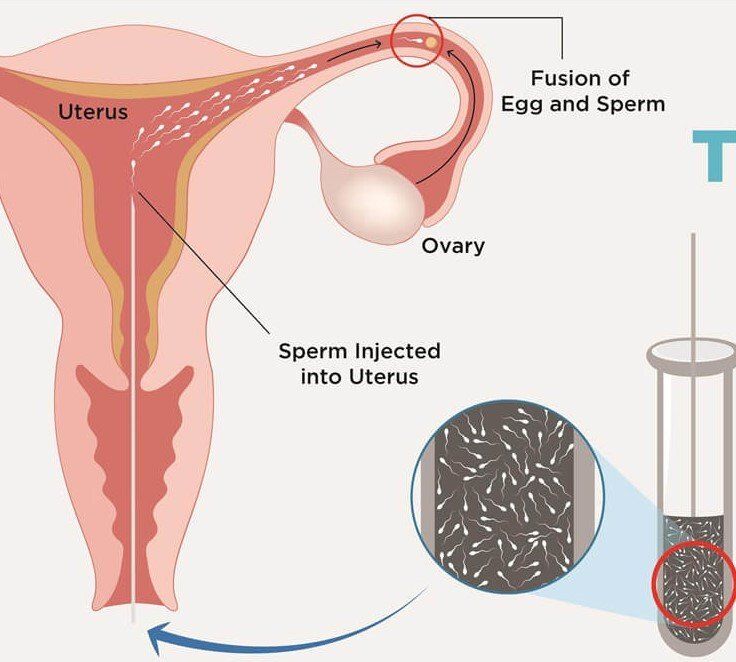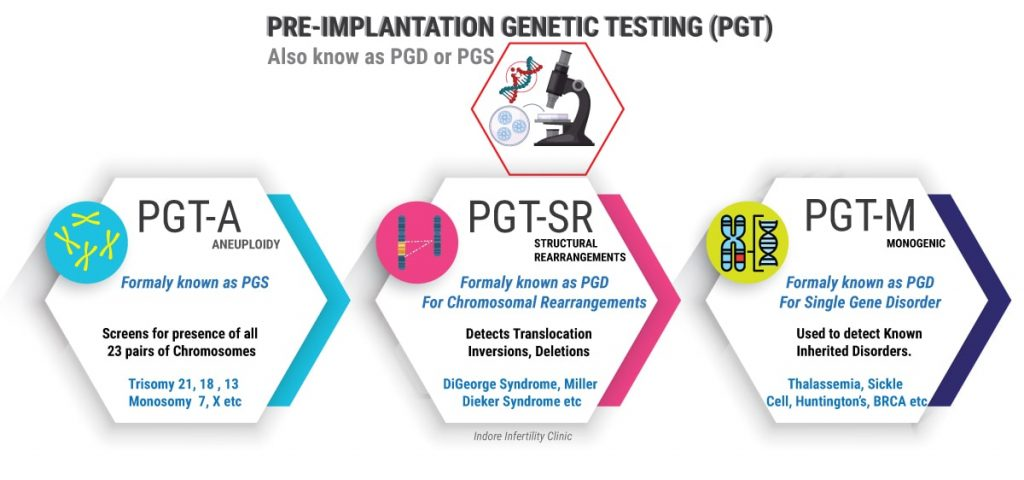Preimplantation Genetic Testing (PGT)
Preimplantation Genetic Testing is a process is to evaluate the chromosomal makeup of an embryo and to look for other specific genetic abnormalities. This technology, known as next-generation sequencing, enables the evaluation of embryos for genetic problems prior to transferring them into the uterus, thus increasing the probability of a having a healthy pregnancy.
PGT-A (For Aneuploidy)
PGT can test for and potentially prevent many diseases and genetic disorders:
Aneuploidy is a condition where a cell has an incorrect number of chromosomes—too many or too few. Chromosomes contain all genes and DNA; the building blocks of the body. Humans have 46 chromosomes, or 23 pairs. These include chromosomes 1 to 22 (the autosomes) and chromosomes X and Y (the sex chromosomes). During fertilization, an embryo receives 23 chromosomes from the sperm and 23 chromosomes from the egg to form either 46,XY (normal male) or 46,XX (normal female). Aneuploidy disorders do not typically run in families and can include Down Syndrome, Trisomy 18, Trisomy 13 and Turner Syndrome.
Because the majority of miscarriages are due to chromosomal abnormalities, many couples undergo PGT in order to select embryos that are chromosomally “normal” and increase their chances of success with IVF.
An embryo with too many or too few chromosomes (aneuploidy) may result in the following:
- Failure of implantation in the uterus
- Pregnancy loss (miscarriage)
- Abnormal pregnancy such as Down Syndrome (trisomy 21) or Edward’s Syndrome (trisomy 18)
PGT-A can also be used for gender selection (boy or girl) in situations where couples desire family balancing or who are at risk for having a child with a sex-linked disease.
PGT-M (For Monogenic Disorders)
Single Gene Defects: These genetic disorders are caused by inheritance patterns (recessive or dominant) and can be passed on if they are prevalent in families. Some of the more common single-gene disorders include Tay-Sachs disease, Cystic Fibrosis, Muscular Dystrophy, Fragile X Syndrome or Spinal Muscular Atrophy. Cystic Fibrosis (CF) is one of the most common genetic disorders. People who are carriers of a disorder are not affected with CF due to the fact they have one normal, matching gene in their double stranded DNA. If, however, an embryo is produced that inherits both abnormal genes (one from the mother and one from the father), Cystic Fibrosis will result. Thus, when both parents are carriers, the risk of conceiving a baby with CF disease is 25%. PGT-M is useful for couples with these heritable genetic mutations carried by one or both parents.
PGT-SR
(For Chromosomal Structural Rearrangements)
Chromosome Translocations: These are abnormalities of a chromosome’s structure. Translocations occur when fragments or pieces of a chromosome break off and rearrange onto a different chromosome or rearrange within itself. Balanced translocations contain all genetic information, but pieces of chromosomes have switched places resulting in no gain or loss of chromosome material. Unbalanced translocations result in an individual having more or less chromosomal material, thus causing genetic defects. These genetic problems can result in an unbalanced embryo, destined to miscarry. PGT-SR can assist in identifying balanced or unaffected embryos to improve IVF success for couples affected with chromosome translocations.
Limitations of PGT
The risk of a misdiagnosis resulting in a fetus or baby with chromosome abnormalities after PGT is less than two percent. However, PGT is unable to study every chromosome and does not guarantee the birth of a healthy baby. Because of these limitations, prenatal testing later in pregnancy is strongly advised in order to confirm the diagnosis and review the number and structure of all the chromosomes.
Depending on cell development and several other factors, some PGT testing may yield no diagnosis for individual embryo/s. Sometimes, no normal embryos are identified for embryo transfer. The likelihood that this will happen is often dependent on your age, as risk of chromosomal abnormalities increases with age.
Should I have genetic testing/PGT performed on my embryos?
This depends on a number of factors including your age, medical history, family history and other risk factors. As a rule, genetic testing can improve pregnancy rates by identifying those embryos that are most likely to make a baby.






